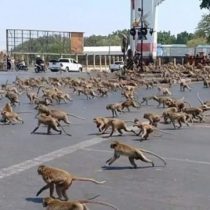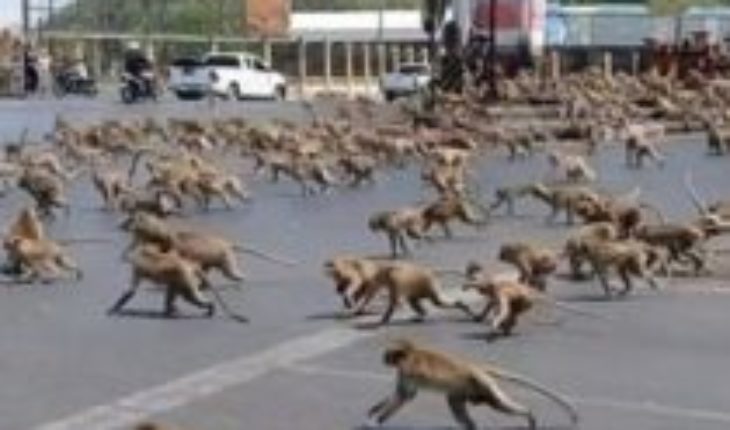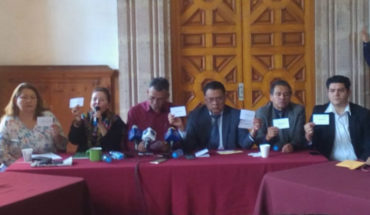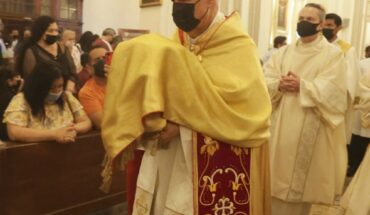
Elephants exploring corn-strewns in Wuhan end up sleeping because of alcohol, hundreds of fish swimming through the canals of Venice, an immense number of monkeys running through the streets of Lopburi in Thailand, beautiful peacocks strolling through a small street in Madrid, a cougar in the eastern sector of Santiago. Although some of that news did not happen as they were shared, there is something interesting and novel about them that we would like to reflect on.
The virus isn’t just death. The global situation with respect to coronavirus has completely turned us around. The pandemic can teach us many things and reveal selfishness and pettiness. He’s already doing it.
According to the particular Slovenian philosopher and psychoanalyst, Slavoj Zizek, this pandemic may mean the reinvention of a type of communism, necessary for the future life of the planet. Byung-Chul Han, a Berlin-based Korean philosopher, believes that view is wrong. China will rise and capitalism will continue stronger than ever, despite its ory ironic phase uncovered over the past decade. People will continue to pay for cruises and airlines will go viral again.
Coronavirus will not reinvent life in society. Well, that won’t be achieved by a virus, not a plague, not a collapse. This is the task of human beings and requires a specific sociopolitical and cultural horizon. All of this takes time. And not months. A movement in the social and political compass requires a painful break. Any change in this scale is painful. It requires that other virtues emerge that are not the main ones: hospitality, solidarity, resignation, surrender, gift and abandonment for the other.
But what we continue to witness in Chile is rather the opposite: pride, an exhibition of the possibilities of a few and irresponsibility, because, deep down, “the other does not exist”. Governments have seen no people for decades, but figures and everything is measured under the stick of GDP. The virus is not just death, but it can become so if we don’t make the most of the new time – the emergence of time – to think of us as a society. Perhaps, but only perhaps, quarantine – self-convened or obligatory – has been the best opportunity to think calmly about the New Constitution and the values we want written in it.
According to Walter Benjamin, the real revolution would occur with an interruption of time (of modern progress), Who knows and this pandemic may be the beginning of such disruption? The utopia of mutual coexistence. It is true that we can speculate on the dystopian scenarios that are multiplying into columns and reflections.
However, all of this is far from the reality of a country like ours. The popular revolt of October 18 made it clear to us that we are not a country of irreconcilable mudes. That’s, perhaps, one of the best news we’ve ever received. We believe, the more than two million citizens that we have manifested ourselves in the streets, neighborhoods, squares; those of us who have met in families, with friends and in organizations and communities, that the virus of forgetting the other is not a hopeless pandemic. In fact, it is not adventurous to say that the fruits and possibilities that in Chile began to awaken on October 18th are similar to those that the coronavirus can push.
One of the desires fueled by the planetary ecosocial crisis is the utopia of non-violence between animals and humans, an idea present from the first of humanity. This notion has taken several names and is represented by harmony, by the idea of Gaia, or by eco-religious narratives such as those elaborated in Genesis or by the prophet Isaiah, according to which , “the baby will put his hand into the hole of the serpent and the lion will eat straw (Is 11:1-9).
We could add the imaginary of Good Living and other evocative articulations of a “better past” and longings for a time of messianic peace. The coronavirus reminds us that this is our life and history: with these frailties, helplessness and mistakes. That the present time is what concerns us, if we expect a different future. The utopia where lions roam the Alameda and the fish swim happily through the Mapocho does not have a real correlation in the face of the misery of public hospitals nor the social distance that rudely continues to appear now in the form of rich quarantines or works of Poor.
The utopia type “Avatar” (a happy and harmonious nature-human connection) makes us dream of a society where extinction is not an installed word. But reality is another and without falling into fatalism or rabid pessimism, the great possibility is only in our hands. In the hands of humans capable of turning the wheel of the “forgottenness of the other” (and the Totally Other) and demand justice from the few who continue to hoard everything in their personal barns.
What if the first to receive the vaccine were the ones who have suffered the most in their lives? How would society react if the main stretchers, hospital parts and medicines were for those who have always survived? What would we say if five-star hotels, cathedrals and recreational clubs were opened primarily to welcome the underdog, the unremeaned workers and the unintended teenagers, in case of need? The return of animals is a perfect image for the terror of a society that has fallen into two blunders: that humans are the virus and that those who have always won will continue to do so forever.
The content poured into this opinion column is the sole responsibility of its author, and does not necessarily reflect the editorial line or position of El Mostrador.





